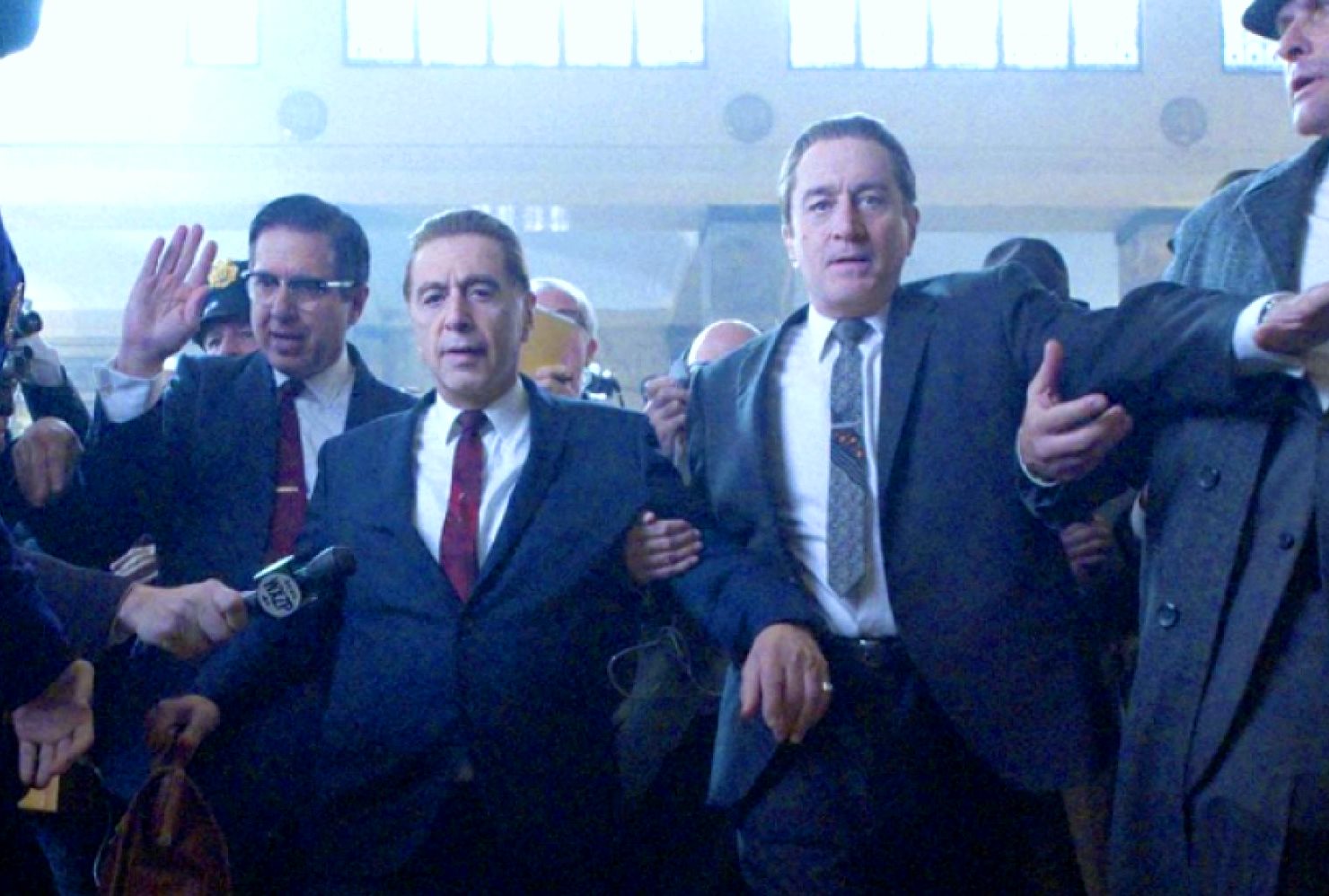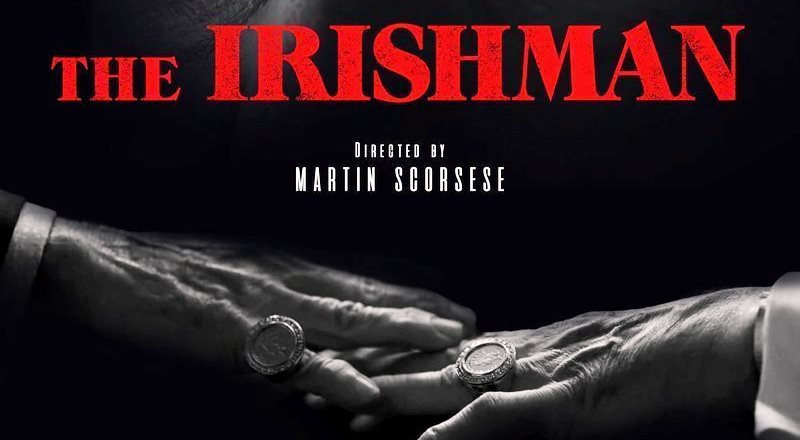
I was there first day for it. On Christmas Day 1992, the Twentieth Century Fox studio released their delicious behemoth onto the public, “Hoffa,” which had all the ingredients for Oscar catnip. It was directed by Danny DeVito, who had three years prior made among the most merciless black comedies ever “The War of the Roses,” a feat in first-class filmmaking. His Teamster epic had the big whirling camera movements, bustling crowd scenes, and shots zeroing in on objects that were meant to serve as metaphors… that came up as empty metaphors. The rest of the movie had vacuous fake signifiers to it as well. At the center of it, Jack Nicholson was cast as Jimmy Hoffa. But it was a rare bad Nicholson performance; looking like he was injected with a tank of helium he barked his dialogue at a rate that would come off as an endless squelch.
Martin Scorsese gets everything lucidly right that DeVito got wrong with his latest three and a half hour epic The Irishman. Hoffa doesn’t show up until the second hour, but when he does, Al Pacino gets the lust of life and the unintended crooked ethics of the man down pat, if blistering. Everything I always wanted to know about Jimmy Hoffa, about why he was really important and a sung hero to the working class man, why he had entanglements with mobsters and bad lawyers, why a little bit too much cut out of the pension pie signified his corruption, and finally why his loudness in his bid to reclaim his Teamster union power following his prison stint led to various underworld forces wanting him rubbed out, all of this given a comprehensive and cohesive treatment by Scorsese.
But Scorsese gives us a lot more than just that.
“The Irishman” is an often great American epic because, the way it opens my eyes, it sinuously traces how insidious forces of the 50’s and 60’s influenced and impacted politics and economics in this country in a way that paved an unsavory destiny not just for its participants in corruption, but for countless normal ancillary families everywhere.
The central star of the film is a de-aged and aging Robert DeNiro (the digital cosmetic surgery, so to speak, is what helped balloon the film’s budget to $150 million). DeNiro is an unassuming truck driver in the 50’s who finds himself delivering perfect steak cuts to mobsters, then agrees to other odd jobs, then misdemeanors, then serious criminal assignments. He answers to Russell Bufalino (Joe Pesci) for a huge bulk of his life, but Harvey Keitel has some serious mojo as a crime boss, and at some point DeNiro’s Frank Sheeran is recommended to go work for Jimmy Hoffa to blow up some cabs and then more.
One of the eye-popping flashbacks of the film is how Sheeran executed captured soldiers in World War II unblinkingly. It hardened him, and disaffected, Sheeran was the perfect impersonal cold-blooded guy to come into the fold to do phantom hitman work.
Scorsese’s “GoodFellas” which still has more vibrancy and chutzpah than any crime saga that there’s ever been. “The Irishman” has a more dense compilation of supporting characters; Scorsese uses a method of doing a little zoom-in then freeze frame then title card on certain characters to inform us of their fates years later. I welcome that, but at the same time there’s so much of that going on that this film begins more amorphous for the first hour.
You can never doubt Scorsese that he knows what’s he doing – the longer <em>The Irishman</em> goes on, the more all-encompassing Scorsese is able to delineate everything here, the way the Kennedy presidency affected mob life, the capitalist competition in big politics and in microcosm the small mom and pop business, the second in command puppets in the Teamsters getting their pockets lined by mobsters, the power of Bobby Kennedy as Attorney General destabilizing mob operations, the cult protection of Hoffa as well as the dismantling of his power. “The Irishman,” when you’re in sync with it, wires all of these things together with surgical precision.
The takedown of Hoffa that led to his disappearance is given such detailed breakdown that it’s not only convincing, it’s a purging of truth. I am dissatisfied with one aspect, though, we’re given a toss-off line as to what happened to Hoffa’s son (played by Jesse Plemons), but it really doesn’t say enough about why he didn’t talk to authorities about his point of view on his missing father.
The final thirty minutes haunts you, with Sheeran in an old folk’s home brewing in his knowledge about all his killings that led to a mysterious death. He has a daughter Peggy (played as an adult by Anna Paquin, frozen in trepidation) who eventually stops speaking to him, cutting him off because she’s been afraid of her father her whole life. DeNiro in the best performance he’s given in years plays this cold-blooded sociopath with honorable regret, but I don’t think he’s weighed down by a shroud of guilt. I believe in a few moments, when he’s all frail bones in a wheelchair, Sheeran secretly wants to tell… to not purge guilt but to gloat (he says so little out of paranoia of the wrong people in his past catching up with him). That’s my interpretation, though, others take on it might vary. I feel the only warm and hearty compassion this man has is for family, for the daughter that has strayed. And it troubles this old killer and beguiles as to why he can’t see why she never cares to speak to him again. We can see why, but in his blind narcissism and “nostalgia” for old times he can’t.
Scorsese got the best of screenwriters to collaborate with him, Steven Zaillian (“Schindler’s List,” “Gangs of New York,” “Moneyball”), which worked off the memoir titled, “I Heard You Paint Houses” by Charles Brandt.
210 Minutes. Rated R.
VIOLENT DOCUDRAMA / ADULT ORIENTATION / LONG AFTERNOON VIEW
Film Cousins: “GoodFellas” (1990); “Hoffa” (1992); “Casino” (1995); “Gomorrah” (2008, Italy).





